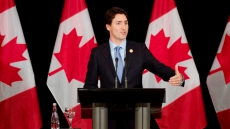MONTREAL — Sergio Bonici is disappointed that his fourplex in Montreal has attracted little interest in four months on the market.
Despite only 10 people coming for a viewing, the 50-year-old has no plans to budge from his asking price of $525,000, noting the property is a revenue generator ideally located near a Metro station and a hospital in the borough of Verdun.
As home sales in Toronto and Vancouver continue to hit record levels, the real estate sector in Canada's second-largest city remains an outlier, with prices almost $100,000 less than the national average.
"I would be more stressed out in those markets," said Bonici. "If there was a downturn, I'd much rather be in this market because the risks are lower."
He said the main challenge is that Montreal buyers don't really understand the revenue property business.
"Being that we have small-time investors here in Quebec, it's harder for them to grasp the numbers. They're looking more at how pretty the property is instead of looking at revenue."
After years of sharp price spikes and housing bubble concerns, Canada's two hottest real estate markets are expected to moderate to levels closer to what most Canadians have experienced.
The Canada Mortgage and Housing Corp. is predicting that national price growth will slow to 1.3 per cent in 2016 and 1.4 per cent in 2017, down from 7.2 per cent this year and 6.7 per cent in 2014, due to softer growth in the two most expensive real estate markets.
Although sales of Montreal's million-dollar homes surged 25 per cent in the first 10 months of 2015, the overall market has seen waning demand from first-time homebuyers looking for cheaper properties.

Amy Assaad of Royal Lepage Heritage said Montreal's real market has slowed in the last three years, although prices remain strong for some luxury condo projects.
"They're still selling but they're just not selling as quickly," she said.
Montreal remains one of the country's best big-city bargains when it comes to buying a home.
The average sales price this year is forecast to be $338,500 in the city, compared to $612,000 in Toronto, $887,600 in Vancouver and $433,600 nationally, according to the CMHC, which relies on figures from the Canadian Real Estate Association and the Quebec Federation of Real Estate Boards.
Political instability is often cited as the reason for lower home prices in Quebec. But while flare-ups in the sovereignty debate or the election of the Parti Quebecois governments have periodically dampened sales, particularly in anglophones districts, other factors may be more dominant, say experts.
Lower levels of immigration, weaker incomes and employment growth, traditional preference for renting and a less dynamic business activity have long constrained consumer demand and depressed prices, says Paul Cardinal, manager of market analysis for the QFREB.
"We're in a relatively balanced market for single detached homes," Cardinal says. "That means there's less pressure on price."
CMHC chief economist Bob Dugan says sales are impacted by population growth, the age of core buyers, economic strength and interest rates.
"The fundamental drivers have been more supportive of house price growth in places like Toronto and Vancouver than Montreal historically," he says.
Mo Chaudhury, finance professor at the Desautels Faculty of Management at McGill University, said weaker economic fundamentals are the main driver behind Montreal's relatively tepid demand.
He said Montreal's business sector isn't as vibrant as Toronto's, with big employers such as Bombardier and companies in the pharmaceutical and forest products industries under pressure.

Quebec's language policies that restrict who can attend English-language schools is also a disincentive for companies to set up shop and attract employees willing to relocate, he added.
The province's historical preference for renting is also a factor, although the trend to ownership has been rising with the growth of the condo market.




